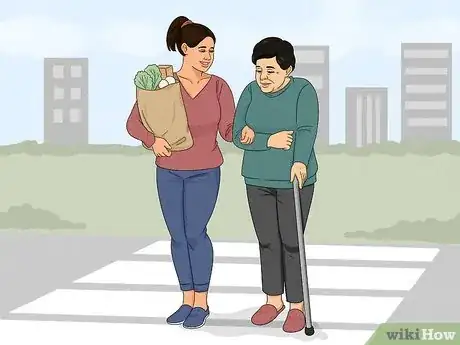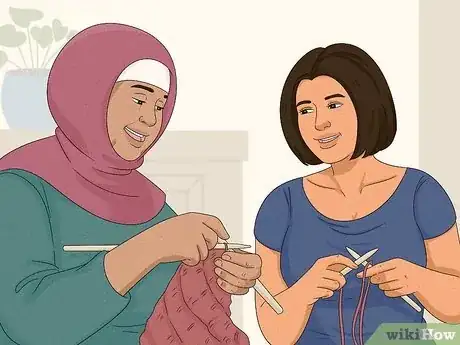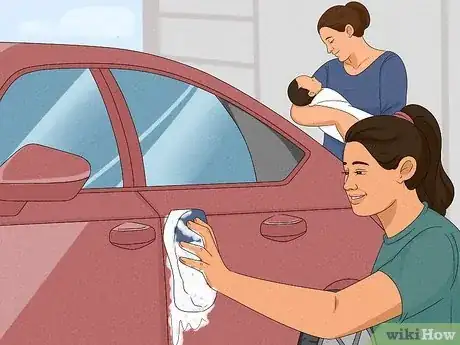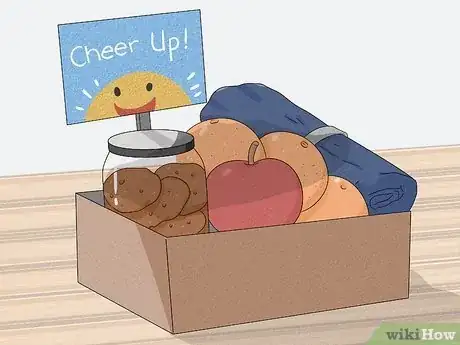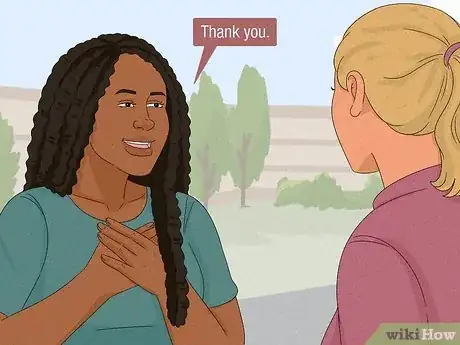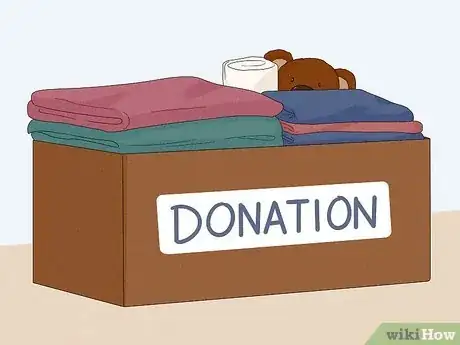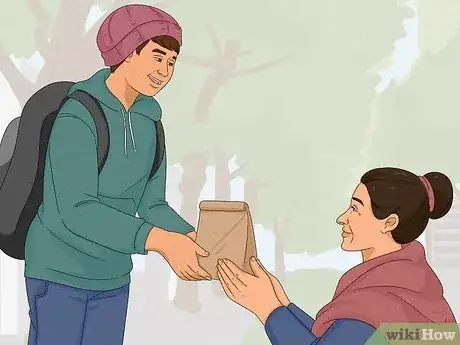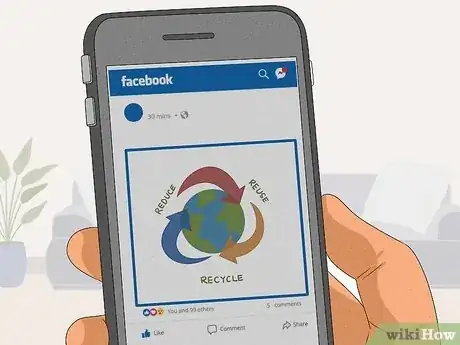This article was co-authored by Direct Relief and by wikiHow staff writer, Glenn Carreau. Direct Relief is an award-winning humanitarian aid organization, active in all 50 states and more than 80 countries. They focus on helping people affected by emergencies and natural disasters. Direct Relief has been highly rated by Charity Navigator, GuideStar, and the Center for High Impact Philanthropy at University of Pennsylvania, for their effectiveness, efficiency, and transparency.
There are 9 references cited in this article, which can be found at the bottom of the page.
wikiHow marks an article as reader-approved once it receives enough positive feedback. This article received 21 testimonials and 87% of readers who voted found it helpful, earning it our reader-approved status.
This article has been viewed 629,767 times.
Helping others is an important part of life; it gives you a sense of purpose and boosts your happiness while positively affecting the world around you. If you want to help others more but aren’t sure where to start, look no further. Whether you're caring for friends and family or giving back to your community, keep reading for the complete guide to helping others.
Things You Should Know
- Give friends and family help by offering comfort, listening, doing chores, and teaching them new skills.
- Help your community by donating and fundraising for causes that you believe in. Volunteer your time as well.
- Helping others allows you to connect with people and get a sense of purpose. The more you help people, the more accomplished you’ll feel.
Steps
Ask people how you can help them.
-
The easiest way to know how you can help others is simply to ask them. Talk to a family member or friend, ask them what they most need help with, and offer your services. Then, follow through and do whatever they've asked of you—actions speak louder than words![1] X Research source
- Make a routine of asking around your circle of friends and family for what they need. Before long, helping others will simply be second nature to you!
Be proactive.
-
Look for opportunities to help and lend a hand without being asked. Practice simple caring gestures, like calling your elderly grandpa to check in or bringing your friend dinner while they’re sick. Don’t wait for someone to ask for help—train yourself to think about all the different ways you can help people, so it becomes second nature. Focus on being as friendly as possible, and you’ll get the hang of it![2] X Research source
- Don’t just look for ways to help the people you know. You could also hold the elevator door for a neighbor or offer to take a photo for a group of tourists if they’re struggling with a selfie stick.
Teach skills to other people.
-
Teaching others helps them learn valuable skills they might need in life. Offer to teach friends and family members who are struggling with a skill you know well, like helping your parents set up social media accounts or teaching a friend how to knit. Teach people outside your social circle, too—try tutoring a student in math, for example, or showing your coworker how to use the office copier.[3] X Research source
- Try not to sound condescending when you offer to teach someone—keep your tone casual and friendly, and say that you’d love to show them the ropes.
- Get creative and use the internet to teach people too! For example, you could make a YouTube video about tie-dyeing shirts or post your special apple pie recipe on social media.
Comfort upset or grieving people.
-
Comfort and compassion can make them feel better as they grieve. Be the first to offer condolences when someone you care about is suffering. Do what you can to give comfort, whether they need a hug, a shoulder to cry on, or a helping hand. Talk to them with empathy and compassion, and ask them if there’s anything you can do to help.[4] X Research source
- For example, it might help a grieving friend if you bring them dinner a few nights each week or do something fun with them to get their mind off of the situation.
- When you talk, say comforting things like, “I can’t imagine what you’re going through, but I want you to know that I’m here for you,” or “I’m so sorry. Is there anything I can do to help you while you deal with this?”
Be a nonjudgmental listener.
-
Sometimes, listening is more helpful and healing than practical assistance. Not everybody is looking for hands-on help or a solution to their problems; they just need to let out their feelings while a supportive friend listens. When someone is telling you about a hardship they’re going through, listen actively and focus on understanding them rather than fixing their problems.[5] X Research source
- When someone is venting, they need a listener who won’t judge them. Stay open-minded and think about how they must feel; judgment will make them feel like they can’t trust you.
- Don’t interrupt or spend the time that they’re talking thinking about your response. When you’re a listener, giving the other person your full attention is important.
Give compliments and offer encouragement.
-
Compliments fulfill people’s emotional needs and make them feel great! While giving compliments might not be what you traditionally picture when you think of helping people, it absolutely does help. Offer compliments to everyone around you, giving sincere praise while celebrating their successes and qualities that you admire the most.[6] X Research source
- For example, you could tell your sibling how great they are at basketball or compliment a co-worker on a job well done after they do a presentation.
- Compliment your significant other if you have one. Be earnest and remind them how smart, gorgeous, and talented they are.
- Give compliments to strangers, too. You can make someone’s day just by stopping long enough to tell them how awesome their Star Wars shirt is or how much you love their blue-dyed hair.
Do a chore for someone else.
-
Tackling another person’s chores is a great way to make their day easier. When people get busy or stressed, chores and jobs often slip through the cracks. Find out from your family and friends what they're too busy to do for themselves, and set aside some time to do the chore for them. Take care of chores without being asked, too—just look for a job that needs doing and take care of it.[7] X Research source
- This could be anything from cleaning up after dinner to mowing a lawn. You might surprise a family member and wash their car or make your spouse’s lunch for them before work.
Send a thoughtful note or care package.
-
You can help just by letting people know that you care. Take time to send your loved ones notes, handwritten cards, and even care packages with special treats inside. When people feel isolated or cut off from their friends, even a small gesture can help them feel more connected and make their day brighter.[8] X Research source
- Write a nice email or letter and casually mention a reason why you like the recipient. Reminisce about something fun you did together, or bring up one of their best qualities.
- Include some of the recipient’s favorite snacks or home-baked goods in a care package, combined with little things that they might enjoy. For example, you might send a new sketch pad if they’re artistic.
Say “thank you” and express appreciation.
-
Receiving thanks makes people feel great about themselves. Plus, showing gratitude will make you happier too! Express your thanks when someone does something nice for you, and let your loved ones know how much you appreciate them even when there’s nothing to thank them for specifically. Practice gratitude by creating a list of things you’re grateful for and sharing them with others.[9] X Trustworthy Source Greater Good Magazine Journal published by UC Berkeley's Greater Good Science Center, which uses scientific research to promote happier living Go to source
- For example, send someone a quick “thank you” note if they give you a gift, or thank your friend for buying you dinner.
- Make a social media post about how much you appreciate your spouse’s support as you change careers, or tell a friend how proud you are that they ran a whole marathon.
- Be especially nice to underappreciated people—like the person bagging your groceries or bussing your table at a restaurant. Their jobs are often thankless, but a few kind words might lift their spirits.
Volunteer for local organizations.
-
Volunteer work improves your community as a whole. Look around for a charity you’d like to support, like a homeless shelter or soup kitchen, and spend time there doing whatever needs to be done. Not only will this help others, but it’ll also give you a newfound appreciation for all the good things in your life—and it’ll make you a more compassionate person.[10] X Research source
- Work at a battered women's shelter and help women and children who have had traumatizing experiences get back on their feet.
- Try tutoring homeless children at the local shelter so that they can stay in school and not fall behind because the economy has been difficult for their families.
- Volunteer for hospice and listen to the stories of the people who are going through their final days, or volunteer at a nursing home and ask to spend time with the people who don’t get visits from family.
Donate to important causes.
-
Donations let you help the community even if you can't volunteer. Pick a charity or organization that you’d like to support, and donate to it however you can. A donation doesn’t have to be money (although you could certainly give money if you can afford to). Donate clothing to a local shelter, or bring non-perishable canned food to a food bank, for example.[11] X Trustworthy Source HelpGuide Nonprofit organization dedicated to providing free, evidence-based mental health and wellness resources. Go to source
- Donate foods like unopened spices, canned soups, or beans.
- Give toys to the local shelters and food banks. Many of the children who take refuge there don't have any toys of their own.
- It’s okay if you don’t have money to spare! Don’t strain yourself when there are other ways to help people. Instead, look through your unused items and set aside anything in decent condition that you can give away.
EXPERT TIPDirect Relief is an award-winning humanitarian aid organization, active in all 50 states and more than 80 countries. They focus on helping people affected by emergencies and natural disasters. Direct Relief has been highly rated by Charity Navigator, GuideStar, and the Center for High Impact Philanthropy at University of Pennsylvania, for their effectiveness, efficiency, and transparency.Humanitarian Aid Organization
 Direct Relief
Direct Relief
Humanitarian Aid OrganizationSupport what matters most to you. According to Direct Relief, a humanitarian aid organization, "It's important for each individual to think about what matters to them, because there’s no “best” cause. A disaster situation offers a clear example because an effective response includes multiple interventions, from medical care, the sheltering of evacuees, animal rescue, and the provision of food and water. No single organization serves all these functions. You might see food banks serving meals to evacuees in a shelter managed by the Red Cross, while volunteer doctors treat people who are sick or injured and pets are cared for by a local humane society.”
Redirect gifts and ask for charity donations instead.
-
Use holidays and birthdays to raise money for important causes. It’s always fun to get presents, but you could celebrate by helping others, alternatively. Ask your friends and family to make donations to charities rather than getting you gifts. Sure, you’ll miss out on a few presents, but you can really make someone else’s day instead![12] X Trustworthy Source HelpGuide Nonprofit organization dedicated to providing free, evidence-based mental health and wellness resources. Go to source
- You could even set up a fund that they can donate to. For instance, you might create a fund to help low-income children go to college.
Stop to help people who need a hand.
-
Be a good samaritan and do acts of kindness for people you don’t know. If you see someone on the street who is struggling to carry all their groceries or who needs money for a bus fare, do what you can to help them out. Be sure to ask if you can lend a hand first (unless it’s something simple, like holding a door). It usually doesn't take much to help another human being!
- For example, you could offer to buy a homeless person a meal or a snack, depending on how much money you can afford to spend.[13] X Research source
- You might spot someone looking for their lost phone or keys and offer to help them search.
- It’s important to ask first because some people might not always need or want help from a stranger. If they say “no,” don’t keep insisting. It’s the thought that counts, and there will be other opportunities to help people.
Promote good causes over social media.
-
Post about important issues to get others to support them too. Use your voice to advocate for people who are often forgotten and raise up other voices that are sometimes silenced. Repost the words of other people affected by those issues to elevate their voices, too. Be prepared to sign a petition, send an email, or call your local government representative.[14] X Research source
Smile and spread positivity.
-
Positivity is infectious, and smiling at someone makes them happier. You never know when other people are having a bad day, whether it’s a friend or someone sitting next to you on the bus. By maintaining a positive attitude and smiling warmly at the people you interact with, you’ll boost their moods and make them more likely to pay it forward by spreading positivity to others.[15] X Research source
- For example, give a big smile when you see your friends and tell them how great it is to see them.
- Smile at your next rideshare driver and thoughtfully ask them how their day has been going.
- Make a point to be the kindest to negative people. Often, the ones who need help most aren’t always easy to be around—but by showing them kindness, you can change their perspective and lighten their mood.
You Might Also Like














References
- ↑ https://bethere.org/Show-You-Care
- ↑ https://navstress.wordpress.com/2020/02/20/15-simple-ways-to-show-someone-you-care/
- ↑ https://navstress.wordpress.com/2020/02/20/15-simple-ways-to-show-someone-you-care/
- ↑ https://omh.ny.gov/omhweb/grief-infographic.pdf
- ↑ https://studentaffairs.baruch.cuny.edu/counseling/referring/
- ↑ https://navstress.wordpress.com/2020/02/20/15-simple-ways-to-show-someone-you-care/
- ↑ https://navstress.wordpress.com/2020/02/20/15-simple-ways-to-show-someone-you-care/
- ↑ https://navstress.wordpress.com/2020/02/20/15-simple-ways-to-show-someone-you-care/
- ↑ https://greatergood.berkeley.edu/article/item/how_gratitude_changes_you_and_your_brain
- ↑ https://www.justgive.org/donations/help-homeless.jsp
- ↑ https://www.helpguide.org/articles/healthy-living/coronavirus-how-to-help-give-back.htm
- ↑ https://www.helpguide.org/articles/healthy-living/coronavirus-how-to-help-give-back.htm
- ↑ https://www.geneseo.edu/health/howtohelp
- ↑ https://kidshealth.org/en/teens/natural-disaster.html
- ↑ https://navstress.wordpress.com/2020/02/20/15-simple-ways-to-show-someone-you-care/
About This Article

If you want to help others, offer your assistance to friends and family around you and listen to what they have to say. Sometimes, all they need is someone to listen to their feelings without any judgment. Whenever they are overwhelmed with jobs or chores, see if you can help out in any way. To further help out your community, find a shelter or area in your town where you can volunteer. If you have spare change, consider donating to important causes near you. To learn more about how to help others online or across the world, continue reading the article!

